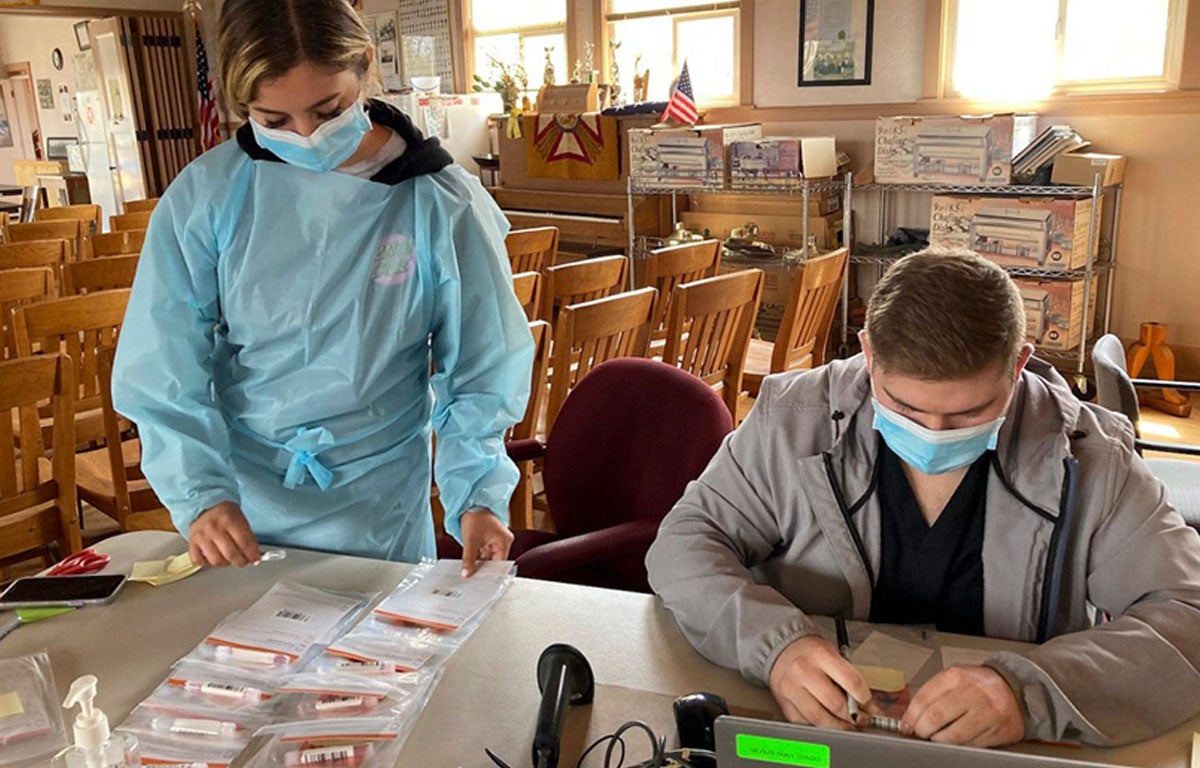
Vaccination against COVID-19 likely prevented 140,000 deaths and three million infections in the US in the first few months that the shots were available, according to a study published recently in the journal Health Affairs.

The report “brings into focus the dramatic success of the early months of the nation’s coronavirus vaccine rollout,” senior author and RAND Corp. researcher Christopher Whaley, PhD, said in a press release. “The findings provide support for policies that further expand vaccine administration to enable a larger proportion of the nation’s population to benefit.”
Researchers examined vaccination data from December 2020 to May 2021 and found that, on average, the COVID-19 mortality rate in each state declined by five deaths per 10,000 adult residents.
The study was published a few days before the US Food and Drug Administration announced on August 23 that it granted full approval to Pfizer’s COVID-19 vaccine for use in people 16 and older. Before that action, the FDA had been permitting use of the vaccines made by Pfizer and two other drug companies under an emergency use authorization, received after the drugs proved effective in three clinical trials. Moderna filed for full approval of their vaccine in June, and Johnson & Johnson is expected to request full approval for theirs shortly.
Pfizer was the first of the three drug makers to apply for full FDA approval. “The application from Pfizer included updated data from the existing clinical trials and a longer-term follow-up observing a larger clinical trial population,” journalist Jessica Roy explained in the Los Angeles Times.
“The Moment You’ve Been Waiting For”
Three in 10 unvaccinated Americans said they would get their shots once a vaccine received full approval from the FDA, according to a KFF poll.
“If you’re one of the millions of Americans who said that they will not get the shot . . . until it has full and final approval of the FDA, it has now happened,” said President Joe Biden last week. “The moment you’ve been waiting for is here. It’s time for you to go get your vaccination and get it today.”
Unvaccinated people are five times more likely to contract the virus than immunized people, according to the US Centers for Disease Control and Prevention. Although breakthrough COVID-19 infections do occur in vaccinated people, those who have been inoculated are far less likely to become seriously ill or die from their infections.
The surge in COVID-19 cases filling emergency rooms and intensive care units consist almost entirely of unvaccinated people. Experts including Anthony Fauci, MD, director of the National Institute of Allergy and Infectious Diseases, are hopeful that the FDA approval, combined with increasing numbers of vaccine mandates from large employers, will encourage Americans to get the shots in sufficient numbers to bring the pandemic under control by next spring.
“I think there are probably about 20 or more percent of people who are not getting vaccinated . . . who will now step forward and get vaccinated,” Anthony Fauci told NPR journalist Mary Louise Kelly in an interview following the FDA approval. Ninety million Americans eligible for the shots remain unvaccinated, Fauci said.
California Hospitals Flooded with Unvaccinated COVID-19 Patients
California counties where vaccination rates are low have been slammed by the recent surge in COVID cases, with infections driven by the highly contagious Delta variant of the virus. Hospitals in six rural counties have been inundated with new patients, according to CalMatters. “Driven by sharp spikes in infections and low vaccination rates, COVID-19 patients hospitalized in Del Norte, Tuolumne, Lake, Humboldt, Nevada, and Mendocino Counties have more than tripled in the past five weeks,” Kristen Hwang reported.
Amador, Placer, and Shasta Counties have around the same numbers of hospitalized COVID patients as they had during to the winter surge.
When Del Norte County reopened along with the rest of the state in June, “We were not as vaccinated as we should have been,” Melody Cannon-Cutts, Del Norte County’s public health program manager, told Hwang. By mid-August, 41.7% of Del Norte residents were fully vaccinated, and in Lake County, 49.6%. Those are far below the statewide rate of 64%.
Jaquelyn Lugg, a spokesperson for Adventist Health Sonora, told Hwang that the hospital is seeing COVID-19 infections in patients who are old and young regardless of underlying conditions. “The one thing almost all of them have in common is not being vaccinated,” Lugg said. All the patients requiring ventilators or ICU treatment were unvaccinated, as were 86% of others admitted to the hospital for COVID-19 treatment, she added.
Sonora, which was threatened by wildfire last week, also contended with poor poor air quality, increasing vulnerability to COVID-19.
There is hope that the surge could change views on vaccinations. “Vaccine uptake could still change as the virus tears through parts of the country,” wrote Adela Suliman in the Washington Post. “Seeing their friends get sick and local hospitals fill up again with COVID patients may speed them along and add to their ranks,” said Drew Altman, chief executive officer of KFF, in a statement to the Post.
Big Nudges from the Private Sector
The daily tally of people getting first doses of the coronavirus vaccine has risen by more than 70% since mid-July, White House officials said on August 24. On average, nearly 450,000 Americans a day are getting their first shot, up from 260,000 a month ago, Derek Hawkins reported in the Washington Post. Slightly more than half (51.1%) of people in the United States are fully vaccinated, according to the CDC.
An additional nudge will come in the form of private sector vaccine mandates. “Equally as impactful would be that there are going to be organizations and enterprises and companies — whoever — are going to feel much more empowered now to mandate vaccines,” Fauci told NPR’s Kelly.
Shortly after the FDA’s announcement last Monday, Mayor Bill de Blasio mandated vaccinations for New York City’s public school teachers and staffers, requiring them to have at least one shot by September 27. Previously, the city required public school employees to get vaccinated or undergo weekly testing for COVID-19.
California currently requires that all school staff members either show proof of full vaccination or be tested at least once per week. Noting that “recent outbreaks in health care settings have frequently been traced to unvaccinated staff members,” the state has also mandated that all health care workers in California be fully vaccinated by September 30. Health care workers must be vaccinated unless they meet the requirements for a religious or health-related exception. Those who are granted an exemption will be required to take weekly COVID-19 tests. Democratic state lawmakers are considering vaccine mandates to enter hotels, indoor restaurants, gyms, sports arenas, and other facilities, according to Politico’s Susanna Luthi.
Los Angeles and San Jose are among the California cities that have set their own deadlines for mandatory vaccinations for many workers on their payrolls.
A day after the FDA announcement, CVS Health, Deloitte Touche Tohmatsu Limited, and Walt Disney Co. said they would add or expand vaccine requirements for workers, Jena McGregor wrote in the Washington Post. The Pentagon responded by adopting mandatory vaccination requirements for the nation’s armed forces effective immediately.
Peter Chin-Hong, MD, a professor of medicine and an infectious diseases specialist at UCSF, told Los Angeles Times reporter Hayley Smith that these requirements will give the biggest boost to vaccination rates.
“It will come from mandates,” Chin-Hong said. “It will lead to more companies in the private sector and the public sector [mandating vaccines] after this full approval.”
Authors & Contributors

Heather Tirado Gilligan
Heather Tirado Gilligan is a journalist who has written for publications including Slate, The Nation, CNN, and the Washington Post. Previously, she was executive editor of the California Health Report, a news nonprofit covering disparities in health and access to health care. Heather received a master’s degree in journalism from UC Berkeley and a PhD in English from Rutgers University, where she studied race in American culture.



